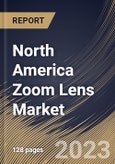A zoom lens permits variable focal length. This adjustment enables the photographer to alter the subject's magnification without physically approaching or receding from the subject. In simpler terms, the lens enables users to zoom in to capture distant subjects and zoom out to capture a broader view. In contrast to prime lenses, which have a fixed focal length, these lenses provide versatility by incorporating a variety of focal lengths into a single lens. Zoom lenses are frequently used in various photographic genres, such as landscape, portrait, sports, and wildlife photography, where the flexibility of rapidly changing framing and composition is useful.
Including digital single-lens reflex (DSLR), mirrorless, and camcorder cameras, zoom lenses are frequently used in various camera types. These lenses offer various focal lengths, commonly indicated by two numerals that represent the lens's lowest and maximum focal lengths (18-55mm or 70-200mm). This range is known as the "zoom range" of the lens.
The telephoto lens, which features cutting-edge zooming optics, is one specialized form of zoom lens. Telephoto lenses enhance photographers' ability to focus on distant subjects, allowing them to capture precise, detailed images that would otherwise be difficult. These lenses are particularly useful when photographing distant subjects, such as wildlife or sporting events. Zoom lenses are essential for photographers seeking flexibility in their creative processes, whether standard or specialized telephoto zoom lenses.
The medical imaging industry is vital in driving the demand for zoom lenses in North America. Zoom lenses like digital cameras, endoscopes, and surgical microscopes are integral to medical imaging equipment. The veterinary field in North America also relies on medical imaging for diagnosing and treating animals. The growth of e-commerce platforms further makes it easier for consumers to access various camera equipment, including zoom lenses. Online retailers and marketplaces play a significant role in facilitating the sale of Zoom lenses, providing consumers with a convenient way to purchase such products. All these factors will uplift the regional market expansion in upcoming years.
The US market dominated the North America Zoom Lens Market, by Country in 2022, and would continue to be a dominant market till 2030; thereby, achieving a market value of $1.8 billion by 2030. The Canada market is estimated to witness a CAGR of 9.5% during (2023 - 2030). Additionally, The Mexico market would showcase a CAGR of 8.5% during (2023 - 2030).
Based on Application, the market is segmented into Photography, Surveillance, Medical imaging, Industrial inspection, and Astronomy. Based on Type, the market is segmented into Standard, Wide-angle, Telephoto, and Macro. Based on countries, the market is segmented into U.S., Mexico, Canada, and Rest of North America.
The market research report covers the analysis of key stake holders of the market. Key companies profiled in the report include Carl Zeiss AG, Fujifilm Holdings Corporation, ARRI AG, Sony Corporation, Nikon Corporation, Canon, Inc., Tamron Co., Ltd., Cooke Optics Limited (Caledonia Investments Plc), Kenko Tokina Co., Ltd., Angénieux (Thales Group)
Scope of the Study
Market Segments Covered in the Report:
By Application (Volume, Thousand Units, USD Million, 2019-2030)- Photography
- Surveillance
- Medical imaging
- Industrial inspection
- Astronomy
- Standard
- Wide-angle
- Telephoto
- Macro
- US
- Canada
- Mexico
- Rest of North America
Key Market Players
List of Companies Profiled in the Report:
- Carl Zeiss AG
- Fujifilm Holdings Corporation
- ARRI AG
- Sony Corporation
- Nikon Corporation
- Canon, Inc.
- Tamron Co., Ltd.
- Cooke Optics Limited (Caledonia Investments Plc)
- Kenko Tokina Co., Ltd.
- Angénieux (Thales Group)
Unique Offerings
- Exhaustive coverage
- The highest number of Market tables and figures
- Subscription-based model available
- Guaranteed best price
- Assured post sales research support with 10% customization free
Table of Contents
Companies Mentioned
- Carl Zeiss AG
- Fujifilm Holdings Corporation
- ARRI AG
- Sony Corporation
- Nikon Corporation
- Canon, Inc.
- Tamron Co., Ltd.
- Cooke Optics Limited (Caledonia Investments Plc)
- Kenko Tokina Co., Ltd.
- Angénieux (Thales Group)








